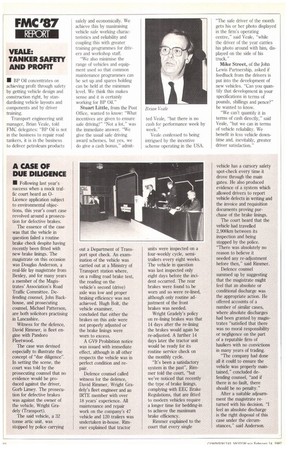A CASE OF DUE DIUGENCE
Page 34

If you've noticed an error in this article please click here to report it so we can fix it.
• Following last year's success when a mock traffic court heard an 0Licence application subject to environmental objections, this year's court case revolved around a prosecution for defective brakes.
The essence of the case was that the vehicle in question failed a routine brake check despite having recently been fitted with new brake linings. The magistrate on this occasion was Douglas Anderson, a real-life lay magistrate from Bexley, and for many years a member of the Magistrates' Association's Road Traffic Committee. Defending counsel, John Backhouse, and prosecuting counsel, Michael Patterson, are both solicitors practising in Lancashire.
Witness for the defence, David Rirnmer, is fleet engine with Pandoro Fleetwood.
The case was devised especially to illustrate the concept of "due diligence". In setting the scene, the court was told by the prosecuting counsel that no evidence would be produced against the driver, Gorb Limey. The prosecution for defective brakes was against the owner of the vehicle, Wright Gradely (Transport).
The said vehicle, a 32 tonne artic unit, was stopped by police carrying out a Department of Transport spot check. An examination of the vehicle was carried out at a Ministry of Transport station where, on a rolling road brake test, the reading on the vehicle's second (drive) axle was low and proper braking efficiency was not achieved. Hugh Bolt, the vehicle examiner, concluded that either the brakes on this axle were not properly adjusted or the brake linings were worn to excess.
A GV9 Prohibition notice was issued with immediate effect, although in all other respects the vehicle was in perfect condition and repair.
Defence counsel called witness for the defence, David Rimrner, Wright Gradely's fleet engineer and an 1RTE member with over 18 years' experience. All maintenance and repair work on the company's 47 vehicle and 120 trailers was undertaken in-house. Rimmer explained that tractor
units were inspected on a four-weekly cycle, semitrailers every eight weeks. The vehicle in question was last inspected only eight days before the incident occurred. The rear brakes were found to be wont and so were re-lined, although only routine adjustment of the front brakes was needed.
Wright Gradely's policy on re-lining brakes was that 14 days after the re-lining the brakes would again be re-adjusted. A further 14 days later the tractor unit would be ready for its routine service check on the monthly cycle.
"It's been a satisfactory system in the past", Rimmer told the court, "but we've noticed that recently the type of brake linings, complying with EEC Brake Regulations, that are fitted to modern vehicles require a longer time for bedding-in to achieve the maximum brake efficiency.
Rirnmer explained to the court that every single vehicle has a cursory safety spot-check every time it drove through the main gates. He also produced evidence of a system which allowed drivers to report vehicle defects in writing and the invoice and requisition documents proving purchase of the brake linings.
The court heard that the vehicle had travelled 2,900km between its inspection and being stopped by the police. "There was absolutely no reason to believe it needed any re-adjustment before then," said Rimmer. Defence counsel summed up by suggesting that the magistrate might feel that an absolute or conditional discharge was the appropriate action. He offered accounts of a number of similar cases, where absolute discharges had been granted by magistrates "satisfied that there was no moral responsibility or negligence on the part of a reputable firm of hauliers with no convictions in many years of trading, "The company had clone all it could to ensure the vehicle was properly maintained," concluded defending counsel. "and if there is no fault, there should be no penalty."
After a suitable adjournment the magistrate returned with his decision. "I feel an absolute discharge is the right disposal of this case under the circumstances," said Anderson.




















































































